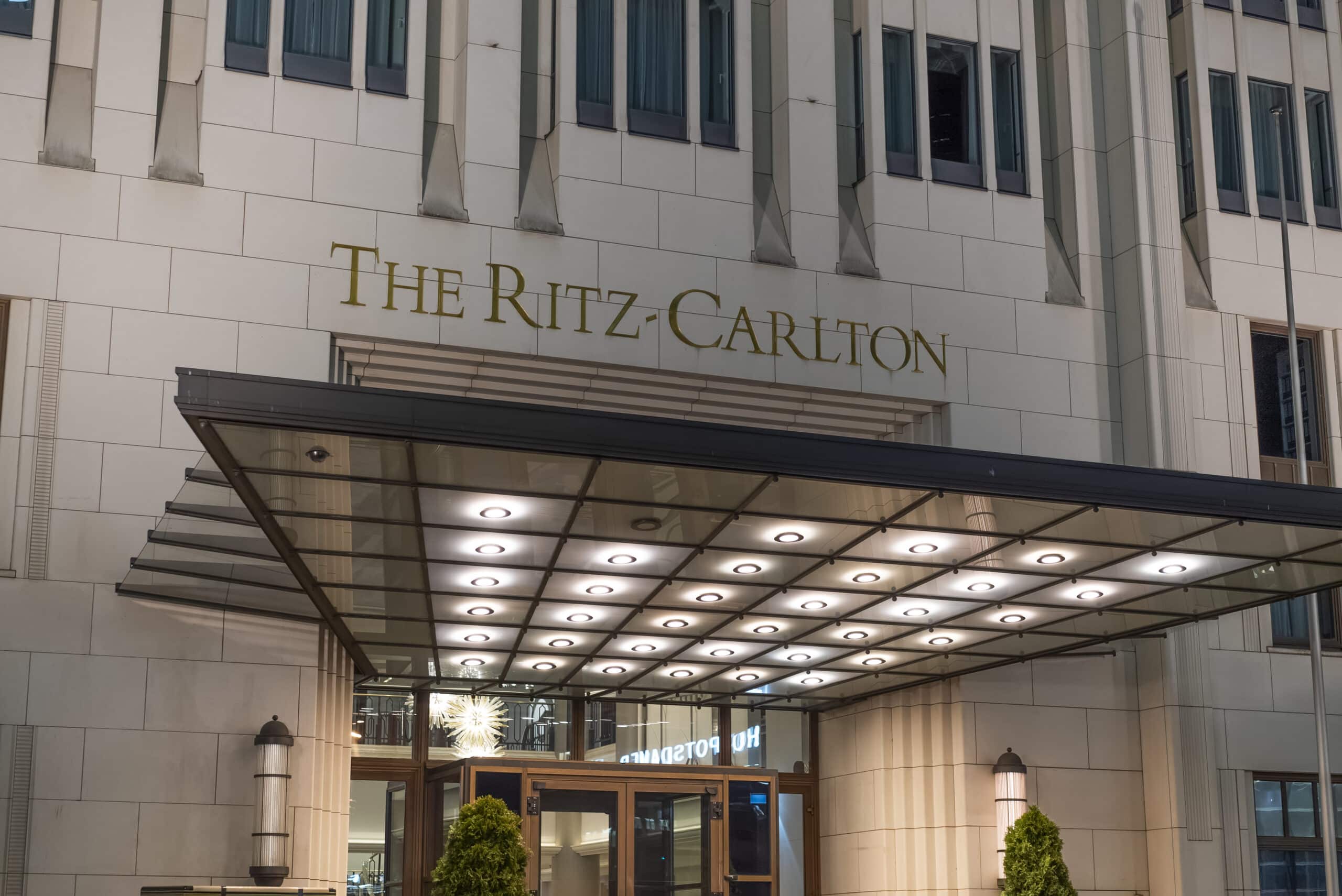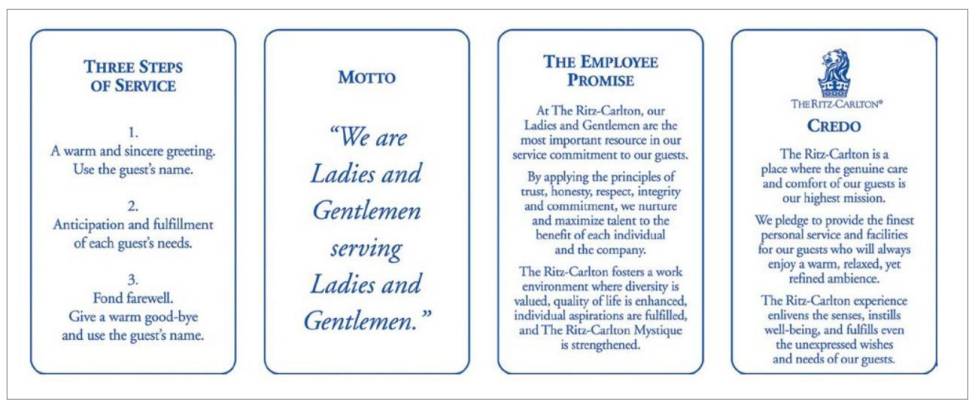When the first Apple store launched in 2001, it was unlike any retail experience. In typical Steve Jobs fashion, he described it as revolution in the way people shopped for personal computers:
“Rather than just hear about megahertz and megabytes, customers can now learn and experience the things they can actually do with a computer, like make movies, burn custom music CDs, and publish their digital photos on a personal website.”
When Steve Jobs and Ron Johnson — Apple’s then-Head of Retail — sat down to plan the store experience, they wanted it to be the best in the world. But they also knew they’d need some killer inspiration.
So they started asking around in Apple’s offices to see what brands came to mind when people were asked, “What’s the best customer experience you’ve ever had?”
The answer they heard over and over again wasn’t Walmart, Target, or Circuit City.
It was a hotel — the Ritz-Carlton.
So Apple enrolled all of its soon-to-be Apple managers in the leadership program at the Ritz-Carlton so they could learn the secrets of its customer experience. Here’s what they found:
4 Secrets of a Legendary Customer Experience

Source: Adobe Stock
The Ritz-Carlton’s customer experience is led by its “Gold Standards,” which are taught to every team member and strictly enforced. They are:
- The Credo
- Motto
- The Employee Promise
- Three Steps of Service
These principles are then printed on Credo Cards and are considered a part of every employee’s uniform:

Source: Ritz-Carlton
1. The Credo
The Ritz-Carlton Credo reads:
“The Ritz-Carlton is a place where the genuine care and comfort of our guests is our highest mission.
We pledge to provide the finest personal service and facilities for our guests, who will always enjoy a warm, relaxed, yet refined ambience.
The Ritz-Carlton experience enlivens the senses, instills well-being, and fulfills even the unexpressed wishes and needs of our guests.”
This Credo could also be considered the brand promise, and it’s obvious how much they care about the experience of guests staying at their hotels. The last line could’ve easily inspired the Apple Store’s ambition to be an immersive and inspiring customer experience that “enlivens the senses” and “instills well-being” in its customers.
2. The Motto
The Ritz-Carlton’s famous motto, “We are ladies and gentlemen serving ladies and gentlemen” reads almost like the Ritz-Carlton’s version of the Golden Rule, “Treat others as you’d like to be treated.”
Not only does this motto help set a standard of care for guests, but it also reminds Ritz-Carlton employees that their employer sees them as equals. The Motto helps set the culture of the Ritz-Carlton as something that empowers employees rather than distrusting or restricting them.
It’s easy to see how Apple could’ve been inspired by this Motto when naming their employees Geniuses — giving them a title that empowers and inspires their work.
3. The Employee Promise
The Ritz-Carlton’s Employee Promise makes it clear that their staff are to be valued, empowered, and respected as the most valuable part of its brand:
“At The Ritz-Carlton, our Ladies and Gentlemen are the most important resource in our service commitment to our guests.
By applying the principles of trust, honesty, respect, integrity and commitment, we nurture and maximize talent to the benefit of each individual and the company.
The Ritz-Carlton fosters a work environment where diversity is valued, quality of life is enhanced, individual aspirations are fulfilled, and The Ritz-Carlton Mystique is strengthened.”
The brand doesn’t just pay lip service to investing in its employees — it makes sure that they’re highly trained and coached. In their first year on the job, employees go through 250 hours of training. That training caters to different learning styles and can be taken as one-on-one coaching, online training, in-person seminars, and other types of learning formats.
In 2012, the secret Apple employee manual, called the Genius Training Student Workbook, was leaked to technology blog Gizmodo. Apple was inspired by the Ritz’s commitment to its employees and its focus on managing guests’ emotions.
Gizmodo described the contents of Apple’s employee handbook this way:
“The manual could easily serve as the Humanity 101 textbook for a robot university, but at Apple, it’s an exhaustive manual to understanding customers and making them happy.
Sales, it turns out, take a backseat to good vibes — almost the entire volume is dedicated to empathizing, consoling, cheering up, and correcting various Genius Bar confrontations.”
4. Three Steps of Service
The Ritz-Carlton’s Three Steps of Service are simple but powerful ways to ensure guests leave with positive feelings and memories:
- A warm and sincere greeting. Use the guest’s name.
- Anticipation and fulfillment of each guest’s needs.
- Fond farewell. Give a warm goodbye and use the guest’s name.
These principles might seem simple at first, but there is some powerful psychology underlying why they’re so effective.
The Psychology That Powers the Experience
Behavioral Science and Psychology tell us that emotions power our opinions and memories of an experience. And these emotions help drive our decision-making (like, whether to buy a Mac instead of a PC, or what hotel to stay in if we have the means to do so).
Unlying this idea is the Peak-end Rule — what I call the “Golden Rule of Customer Experience.” It says that our opinions, judgments, and memories of an experience aren’t built on the average of every moment but on the emotional peak (positive or negative) and the end of the experience.
Peak-end Rule: Our memories and opinion of an experience are based on two points — the emotional peak and the ending.
The approach to customer experience that Apple and the Ritz-Carlton share are built — knowingly or not — on the Peak-end Rule in action. When we manage customers' emotions and endings, customer experiences can go from good to great.
🚀 Learn what makes buyers tick
Join 8k+ of world's best marketers from brands like Disney, Coca-Cola, Google who are learning marketing psychology in <5 mins a week.
Apple’s Biggest Lesson: The Bottom Line
Customer expectations are often set by brands outside your domain, so it pays to model yourself after the best of the best — even if they aren’t in the same industry.
It’s a type of Status Quo Bias, which says that once people get used to something, they feel any change from that norm as a loss.
If someone outside your industry excels at customer experience, customers won’t care if you don’t sell the same thing they do. They still want the speed of Amazon, the selection of Netflix, the simplicity of Apple, and the availability of Uber Eats.
Want to learn more about how your buyers tick (using marketing psychology, behavioral science, and predictive AI)?
👉 When you’re ready, Choice Hacking can help:
- Coaching: Looking for clarity, focus, and confidence in your marketing and/or career? Behavioral Science-powered 1-on-1 Coaching could be a good match for you.
- Courses & Skill Sessions: Improve your customer experience, customer journey maps, presentations, landing page conversion rate, and more with the power of applied behavioral science in a self-directed course.
- Training: We can help your team level up their work with psychology, behavioral science, and AI training.
- Consulting: Get professional insight to grow your business with projects like:
